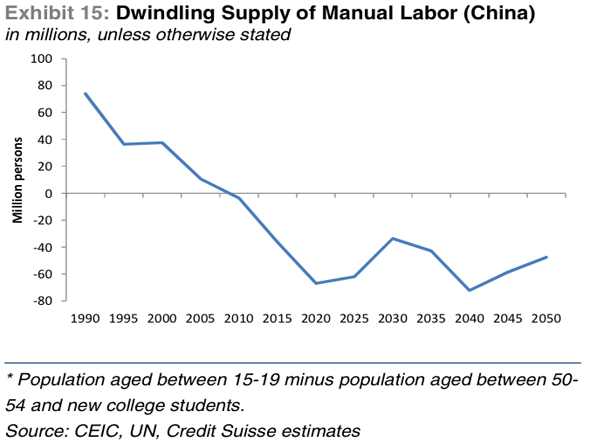I was reading a few pieces over the weekend on the increasing industrial 'robotization' happening in of all places, China. I think for lots of us, our familiarity with Chinese manufacturing processes comes mainly from the recent series of well-publicized articles about Foxconn and their massive manufacturing complexes staffed with what seems like armies of low-to-medium skilled and cheap, (at least relatively cheap) labor.
We know, or we think we know, the Chinese manufacturing advantage, particularly for high-tech manufacturing. While more nimble and adaptive supply chains are certiainly a large part of the story, there is no doubt that the seemingly endless supply of inexpensive human labor has driven significant advantage for the Chinese firms in the last few decades.
But as this piece (and others) point out, demographic trends and economic factors in China are impacting this traditional labor supply and cost advantage, (simply put, China is running shorter of the right kind of laborers, and the current ones are generally demanding higher wages). As the below chart from Credit Suisse illustrates, the supply of the typical Chinese manufacturing worker is decreasing dramatically:

What's the big deal? Well perhaps for your organization, unless you are in a high-tech manufacturing company, maybe this situation in China, and the reactions taken by high-tech firms, (more robots, flight to even cheaper labor cost countries, etc.), might not be relevant at all. But one of the pieces on the labor market in China referred to an economic principle called The Lewis Turning Point, that I had never heard of, but I think might have relevance to any number of the so-called 'hard-to-fill' jobs that many talent professionals continue to wrestle with.
The Lewis Turning Point essentially says this - once a developing economy runs out of affordable and accessible labor, wages will naturally increase, and subsequent technological development and increased efficiency is necessary for investors to continue to realize capital accumulation and ongoing profits.
The Lewis Turning Point suggests that once easy labor runs out, that firms have to do more to continue to be successful - automate, increase wages, diversify, chase more inexpensive labor in new locations - or some combination thereof.
Obviously such a broad-based economic theory can't account for or offer specific remedies for the practical 'can't find anyone for this job' conundrums your organization might be dealing with today, but the 'turning point' does reinforce what perhaps deep down you know is true but don't want to admit publicly. Namely, if you truly have a hard, seemingly impossible to fill position in your organization, in order to make any progress it is quite likely you need to start thinking differently.
Just like how the massive industrial behemoths in China have realized that their labor supply is contracting and increased robotization is their path forward, once you hit the turning point it is either adapt or die, or at least slowly but surely begin to wither.